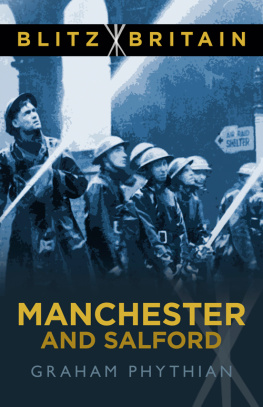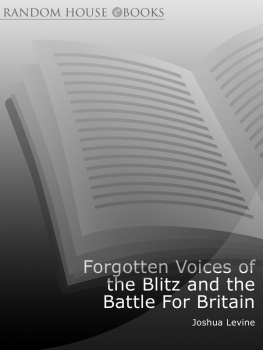
JULIET GARDINER
The Blitz
The British Under Attack

For Martha
Contents
These are the facts, observe them how you will:
Forget for a moment the medals and the glory,
The clean shape of the bomb, designed to kill,
And the proud headlines of the papers story.
Remember the walls of brick that forty years
Had nursed to make a neat though shabby home;
The impertinence of death, ignoring tears,
That smashed the house and left untouched the Dome.
Bodies in death are not magnificent or stately,
Bones are not elegant that blast has shattered;
This sorry, stained and crumpled rag was lately
A man whose like was made of little things that mattered;
Now he is just a nuisance, liable to stink,
A breeding-ground for flies, a test-tube for disease:
Bury him quickly and never pause to think
What is the future like to men like these?
People are more than places, more than pride;
A million photographs record the works of Wren;
A city remains a city on credit from the tide
That flows among its rocks, a sea of men.
Ruthven Todd, These are the Facts
Blitz is an abbreviation of the German word Blitzkrieg, meaning lightning war. It all too accurately describes Hitlers advance through western Europe in May and June 1940, as Norway, then Holland, Belgium and France fell to the German forces within weeks; but it hardly seems appropriate for the almost continual aerial bombardment of the British Isles that started on 7 September 1940 and continued with little relief until 10 May 1941. Yet blitz is the name by which these eight months were known. It was a German word, and like lightning it came from the sky, and could and did kill. Indeed, an air raid was in many ways like a terrible storm the sky livid, rent by jagged flashes, obscured by black clouds rolling across it or lit up by the reflected glow of fires, while the noise of bombs and guns echoed like the thunder of Mars, the god of war.
The blitz was the test of war for the British people: it touched everyones lives, it mobilised the population, and in phrases that have become time-worn but are nevertheless true, put civilians on the front line and made the home front the battlefront. Dunkirk and the Battle of Britain, which preceded it, had essentially been military operations. The blitz was total war. Its intensity and inescapability made it possible to call the Second World War the peoples war, in which, in the words of the poet Robert Graves, a soldier cannot even feel that his rendezvous with death is more certain than that of his Aunt Fanny, the firewatcher.
The blitz was the war that everyone in Britain had been expecting, and fearing, since that warm Sunday morning in September 1939 when Neville Chamberlain had announced that Britain is now at war with Germany. Although there had been sporadic raids throughout the phoney war that followed, it was not until almost exactly a year after that declaration that the Luftwaffe bombers arrived in force over London. Although Englands capital was bombed more heavily and more continuously than anywhere else in the country, the blitz was an attack on the whole United Kingdom: few places escaped its direct effects, none its indirect ones.
In January 1941 George Orwell wrote to the editors of the American journal the Partisan Review, to which he would contribute a London Letter throughout the rest of the war: On that day in September when the Germans broke through and set the docks on fire, I think few people can have watched those enormous fires without feeling that this was the end of an epoch. One seemed to feel that the immense changes through which our society has got to pass were going to happen there and then. But he went on to say that these feelings had been erroneous: to an astonishing extent things have slipped back to normal When all is said and done ones main impression is the immense solidarity of ordinary people, the widespread yet vague consciousness that things can never be the same again, and yet, together with that, the tendency of life to slip back into the familiar pattern.
Just a month later, Orwell was demanding that either we turn this war into a revolutionary war [against privilege and influence, and for equality and freedom] or we lose it. Neither happened. The equivocation and ambivalence of wanting change and wanting things to be as they had always been would persist, and politicians consistently declined to define Britains war aims other than by the simple word victory.
Yet the blitz was a defining moment in Britains history. More than cityscapes were reconfigured in those eight months. The attrition that had been anticipated for over a decade revealed both the incompetence of the authorities, and their misunderstanding of the nature of such warfare and of the needs of the people. But at the same time it demonstrated their sometimes grudging, usually tardy, willingness to accommodate, compromise and innovate. And perhaps, above all, eventually and imperfectly, to listen. To keep the people on side as much as possible, since it was recognised that civilian morale was vital in maintaining full-scale war production and thus Britains ability to prosecute the war at a time when victory was very far from assured. For this reason, and others, the blitz did prove to be a forcing house, a laboratory, the intense distillation of how an external threat could weld together a nation while at the same time failing to resolve many of its tensions.
The blitz has given the British politicians in particular a storehouse of images on which to draw at times of crisis: the symbol of an indomitable nation, united in resolution. The true story is, of course, more nuanced and complicated than that, cross-hatched as it must be by the freight of the prewar years, of differing experiences and expectations. There were thousands of examples of extreme bravery, fortitude and selflessness. There was also a pervasive sense of exhaustion, uncertainty and anxiety, and acts of selfishness, intransigence and contumely. The words that best sum up the blitz are probably endurance and defiance. And arising out of that, a sense of entitlement: that a nation that had been exhorted to take it could reasonably expect, when the war was finally over, to get [some] of it, in terms of greater equality, more employment, better housing, education and life chances in general.
In 1940 the use of the transitive verb to blitz signified to destroy by aerial bombardment. Seventy years later it is sometimes used to mean to deal with something energetically; to concentrate a lot of effort on something to get it done. Both meanings resonate in our understanding of the blitz of 194041 and its aftermath.
Juliet Gardiner
June 2010
I think it is well for the man in the street to realise that there is no power on earth that can prevent him from being bombed. Whatever people may tell him, the bomber will always get through the only defence is in offence, which means that you have to kill more women and children more quickly than the enemy if you want to save yourselves.
Conservative leader Stanley Baldwin, speaking in the House of Commons in 1932
Robert Baltrop was sitting on the roof of a Sainsburys store in east London on Saturday, 7 September 1940. It was a warm late-summer afternoon, the rays of the sun stretching across the concrete rooftops. The air-raid alert had just sounded, so Baltrop, who worked as a porter in the store, humping and cleaning and that sort of thing, had clambered out to take up his post on lookout duty. It wasnt bad being a watcher during these daytime warnings, sitting up there in the sunshine and smoking and watching the sky, and looking down at the people going about their business as usual in the streets below. I wasnt really sure what I was watching for, anything dangerous fires or bombs falling or planes getting near, and I dont really know what I could have done about it. I suppose I should have had to go down the steps and tell them in the shop that a bomb had fallen on them!
Next page



















